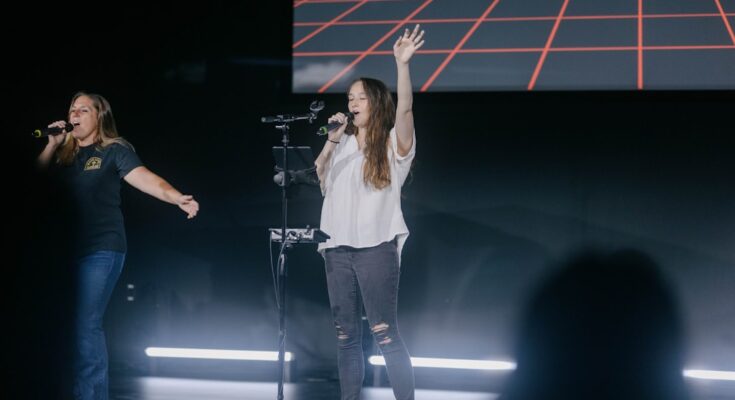Artificial intelligence (AI) has been used much more in the music industry in recent years for music production. AI technology has revolutionized the ways in which music is created, produced, and consumed, opening up new avenues for artists, producers, & music lovers. Artificial intelligence (AI) systems are able to analyze large datasets, spot patterns, and produce music compositions that sound as good as those made by human musicians. As a result, software and tools with AI capabilities have been created to help with different parts of music production, such as mixing, mastering, composition, and arrangement.
Key Takeaways
- AI is revolutionizing music production by offering new tools and techniques for creating music.
- Automation in music creation can streamline the production process and offer new creative possibilities.
- Balancing automation and creativity is essential for maintaining the human touch in music production.
- AI is reshaping the music industry by changing how music is created, distributed, and consumed.
- Ethical considerations in AI-driven music production include issues of copyright, ownership, and authenticity.
Advances in deep learning techniques, machine learning algorithms, and the availability of large music datasets are responsible for the growth of AI in music production. These advancements have made it possible for AI systems to adapt to various musical tastes & produce original compositions by teaching them the nuances of style, genre, and music theory. As a result, AI is now a useful tool for producers and musicians who want to try new sounds, speed up their creative process, and push the limits of conventional music production. It’s clear that technology will continue to have a big influence on how music is made in the future as AI is incorporated into the process more and more.
Composition Software Enabled by AI. One such tool is composition software with AI capabilities, which can produce unique musical ideas based on user input. With the aid of machine learning algorithms, these programs can analyze musical structures and patterns to produce compositions that are in line with particular genres or styles.
Organizing and orchestrating automatically. AI has also been utilized to create instruments for automating orchestration and arrangement of musical compositions. With the help of these tools, musicians can view their work from new angles as they analyze existing compositions to create new orchestral scores or arrangements. Making Mixing & Mastering More Efficient. Artificial Intelligence has advanced significantly in automating not only composition and arrangement but also mixing and mastering.
Artificial intelligence (AI)-driven mixing tools can assess audio files and instantly adjust effects, levels, and panning to produce a more polished, industry-standard sound. In a similar vein, AI mastering tools can employ sophisticated processing methods to maximize a track’s output and guarantee that it satisfies industry requirements for loudness, clarity, and balance. Not only have automation advances improved music production efficiency, but they have also made high-quality production techniques more accessible to musicians and producers of all skill levels. The synthesis of creativity and automation in music creation is a topic of continuous discussion, despite the fact that artificial intelligence has clearly transformed the music production process. Others contend that the application of AI tools and methods may result in a loss of human expression in music and a homogenization of musical styles. They worry that a reliance on AI-generated music and automated procedures may become overly prevalent, possibly limiting the variety of musical expression and suppressing musicians’ creative impulses.
Advocates of AI in music production, on the other hand, think that these instruments can boost creativity by opening up new creative avenues, removing obstacles to creativity, & letting artists explore uncharted ground with their work. For the future of music production, striking the correct balance between creativity and automation is essential. It is imperative that musicians and producers maintain their artistic vision and personal touch in their work, even though AI can help to streamline some aspects of the production process.
In order to do this, AI tools must be carefully incorporated into the creative process, serving as supplements to human creativity rather than as a substitute. Through the adoption of AI as a cooperative collaborator in music production, musicians can leverage its capabilities to broaden their creative perspectives while maintaining the genuineness and profundity of their musical expression. AI has had a significant impact on the music business, changing many aspects of music production, consumption, & distribution. One notable effect is the democratization of music production, since AI-powered tools have reduced the barrier to entry for aspiring musicians and producers, enabling them to produce high-caliber music without a lot of expensive studio gear or technical know-how. This has caused an increase in independently produced music as well as a broadening of the range of musical genres and styles available in the market. AI has also completely changed how people find & listen to music.
Streaming platforms employ artificial intelligence (AI) algorithms to examine user behavior and preferences, generating customized playlists & recommendations based on personal preferences. Due to this, listening to music has changed & now consumers can find new artists and genres that suit their tastes. AI has also been used to uncover patterns in music consumption, which has aided record labels and musicians in making data-driven choices regarding content creation, tour scheduling, and marketing tactics.
But there are some difficulties with how AI is affecting the music business. Aside from concerns about job displacement for musicians and producers, the rise of AI-generated music also raises issues regarding intellectual property rights and copyright ownership. It is crucial for stakeholders to confront these issues head-on & make sure that the ethical ramifications of AI-driven music production are properly taken into account as AI develops & becomes more woven into the fabric of the music industry. The use of artificial intelligence (AI) in music production is becoming more common, & this has raised ethical questions. One ethical worry is that music produced by AI might violate intellectual property rights and copyright regulations. Plagiarism and unapproved replication are risks associated with AI systems that can compose original works that imitate particular genres or artists.
This raises concerns about the proper attribution of ownership rights in AI-generated content & the modification of copyright laws to account for it. How AI affects jobs in the music industry is another ethical factor to take into account. There is worry that as automation technologies develop, AI tools may eventually take the place of human producers and musicians, dislodging those employed in the field & costing them their jobs. Concerns about how AI can augment human creativity rather than completely replace it must be addressed by stakeholders, and they should also consider how they can support individuals impacted by technological changes in the industry. Using AI algorithms to curate and promote music on streaming services has ethical ramifications as well.
Concerns regarding algorithmic bias, data security, and privacy are brought up by the use of tailored recommendations based on user data. In addition to making sure that user data is handled responsibly and ethically, businesses must be open and honest about how they use AI for content curation. Combining Machine-Generated & Human Creativity. Working together with AI to create new musical possibilities by fusing human creativity with computer-generated elements is one area where this collaboration holds great promise. AI algorithms, for instance, can be used by artists to create intricate musical patterns or textures that act as the basis for their compositions, enabling them to add to these structures using their unique creative sensibilities. AI can also enhance live performances by delivering interactive visual elements that react to the music being played or real-time improvisational accompaniment.
Increasing the Horizons of Art. New artistic expressions resulting from these partnerships between AI systems and human musicians should not be surprising as technology develops further. Through the adoption of AI as a collaborator in creativity rather than an adversary, artists can leverage its capabilities to broaden their creative perspectives and produce music that surpasses conventional limits. A Novel Phase in the Composition of Music. Together, AI systems and human musicians can expand the realm of musical expression and push the envelope of what is conceivable, ushering in a new era of creative & expressive music.
There are opportunities and challenges for fostering creativity in the music industry when AI is integrated into the production process. AI has the potential to democratize access to tools & techniques for music creation, expanding the pool of voices that can be heard in the musical landscape. This is a considerable opportunity. Aspiring musicians from all walks of life can unleash their creative potential and share their distinct viewpoints with the world with the help of AI-powered software that is both user-friendly & reasonably priced.
Also, by automating tedious tasks & offering perceptive insights that stimulate original thought, AI has the potential to improve creative workflows. Musicians are free to experiment with non-traditional methods, push the boundaries of their creativity, and concentrate more on the artistic elements of their work without being constrained by technical limitations when certain production processes are streamlined. Nevertheless, there are drawbacks to using AI to foster creativity. One difficulty is making sure AI tools are inclusive and diverse in order to accommodate a broad spectrum of musical genres & cultural influences. In order to keep their artistic vision front and center in their work, artists must also retain agency over the creative output they produce when utilizing AI tools.
In conclusion, even though AI has definitely changed the way that music is produced, industry participants must carefully and morally consider how to integrate AI. Through embracing AI system collaboration and maintaining human creativity and expression, musicians can fully utilize technology to produce innovative music that has a global impact on listeners. Encouraging inclusivity, empowering diverse voices in the industry, and giving ethical considerations top priority are all vital as we continue to explore the potential of AI-driven music production.
If you’re interested in the latest music trends and new albums, you should check out the article “Michigan Rock: The Aimcriers on New Album and Indie Music Trends”. This article discusses the indie music scene and the release of a new album by the Michigan rock band, The Aimcriers. It’s a great read for anyone looking to stay up to date with the latest in music production and creativity.
FAQs
What is the future of music production?
The future of music production is expected to involve a greater integration of AI and automation technologies, allowing for more efficient and innovative music creation processes.
How is AI impacting music production?
AI is impacting music production by enabling tasks such as sound analysis, composition, and even performance to be automated, leading to new creative possibilities and efficiencies in the music-making process.
What are the benefits of AI and automation in music production?
The benefits of AI and automation in music production include increased productivity, access to new creative tools, and the potential for more personalized and tailored music experiences for listeners.
What are the concerns surrounding AI and automation in music production?
Concerns surrounding AI and automation in music production include potential job displacement, ethical considerations related to the use of AI in creative processes, and the impact on the authenticity and originality of music.
How can AI and human creativity work together in music production?
AI and human creativity can work together in music production by leveraging AI technologies to assist and enhance the creative process, allowing for new forms of expression and artistic exploration.



